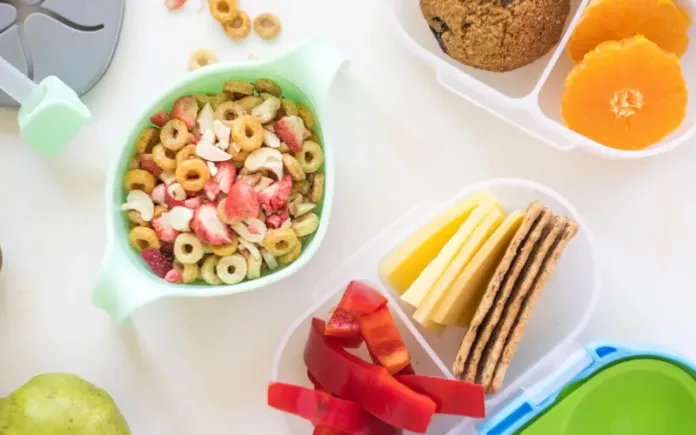It’s difficult to choose the right snacks for your toddler. With so many options, it’s easy to get lost in the choices. Parents want their little ones to enjoy tasty treats, but it’s essential that these also support healthy growth.
Busy lifestyles mean munchies need to be easy to grab and go. However, convenience shouldn’t come at the cost of nutrition. Finding the right balance can make snack time both enjoyable and beneficial for your child. This article will tell you how you can select healthy baby snacks for your toddler.
Nutritional Value: What to Look for
Nutrition is the foundation of healthy snacking. When choosing items, aim for options rich in essential vitamins and minerals. These nutrients fuel growth, support brain development, and keep energy levels steady.
Treats with whole grains, fruits, and vegetables are great choices. Avoid items with empty calories, such as those high in sugars and fats. Reading labels can help you ensure your toddler is getting what they need without unnecessary additives.
Portion Size and Age Appropriateness
Portion size matters a lot when selecting munchies. Toddlers have tiny stomachs, so they need small, manageable portions. Choose ones that are designed with their age in mind. Large pieces or hard textures can be choking hazards.
Soft, bite-sized snacks are safer and more enjoyable for little hands to handle. Age-appropriate portions also help prevent overeating, ensuring your child gets the right amount of food to satisfy their hunger without overindulging.
Allergen Awareness and Safe Ingredients
Keeping your toddler safe from allergens is crucial. Many might contain common allergens like nuts, dairy, or gluten. Always check the ingredient list carefully, especially if your child has known allergies.
Even if your toddler doesn’t have allergies, it’s wise to introduce new foods gradually. Look for items without artificial colours, flavours, and preservatives, as these can sometimes cause reactions in sensitive children.
Organic vs. Non-Organic: Making the Healthiest Choice
Organic treats are often seen as a healthier option. These products are made without synthetic pesticides, fertilisers, or genetically modified organisms (GMOs).
Choosing organic products can reduce your toddler’s exposure to potentially harmful chemicals. However, they can be a bit more expensive. Non-organic ones can also be healthy if they are made from whole, natural ingredients. The key is to focus on the quality of the ingredients rather than just the label.
Texture and Shape: Supporting Developmental Milestones
The texture and shape also play a significant role in a toddler’s development. Chewing different textures helps strengthen oral muscles, which is important for speech development.
Soft items like purees are perfect for younger toddlers, while older toddlers can handle firmer textures like crackers or small pieces of fruit. Those in fun shapes can also encourage self-feeding and make snack time more engaging.
Sugar and Salt Content: What’s Acceptable?
Too much sugar and salt harms young children. Too much sugar causes energy spikes and crashes. Excess salt can strain immature kidneys. When choosing munchies, opt for those with low sugar and salt content.
Fresh fruits are naturally sweet and a better choice than sugary treats. Similarly, unsalted ones are preferable to those loaded with sodium. Always check the nutritional information on packaging to make informed choices.
Convenience for On-the-Go Snacking
Treats that are easy to carry and involve no preparation are ideal for busy parents. Look for ones that come in portable packaging, like resealable pouches or small containers.
These make it easy to store and grab a snack when you’re out and about. While convenience is key, ensure that the items you choose still meet your nutritional standards. Pre-packaged doesn’t have to mean unhealthy if you pick wisely.
Eco-Friendly Packaging Options
Choosing products with eco-friendly packaging is a great way to teach your toddler about caring for the environment. Look for ones that use recyclable or biodegradable materials.
Some brands offer them in reusable containers, which can reduce waste. Teaching children about sustainability early on helps them develop a sense of responsibility for the planet. Eco-friendly packaging is not only good for the environment but also often reflects a commitment to healthier ingredients.
Benefits of Healthy Baby Snacks: Supporting Growth and Development
Healthy munchies do more than just curb hunger; they support your toddler’s overall growth and development. Nutritious ones provide the energy needed for active play, help build strong bones and muscles, and support cognitive development.
By choosing treats rich in essential nutrients, you encourage them to pursue lifelong healthy eating habits. These can also prevent nutritional deficiencies and keep your child energised and happy throughout the day.
Selecting healthy baby snacks for your toddler doesn’t have to be complicated. By focusing on nutrition, portion size, safety, and convenience, you can make snack time both fun and beneficial. Remember, the goal is to provide your child with munchies that support their growth, development, and overall well-being.
